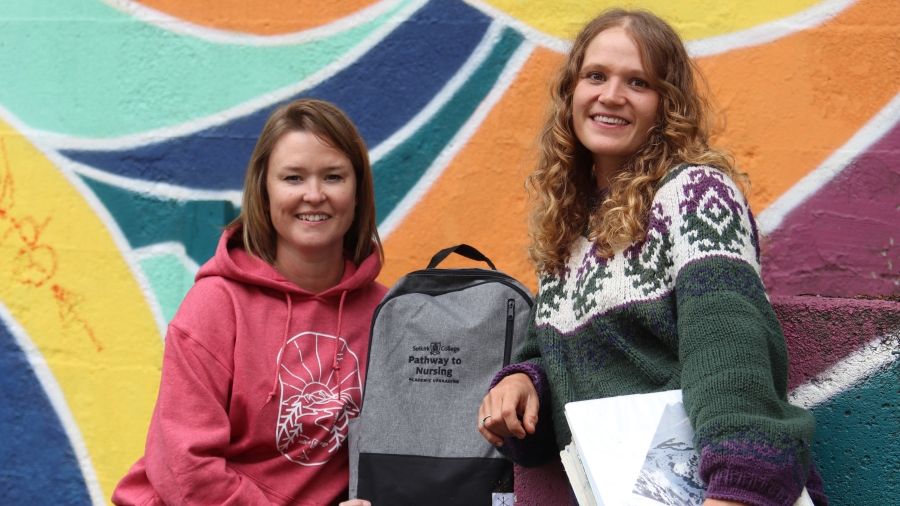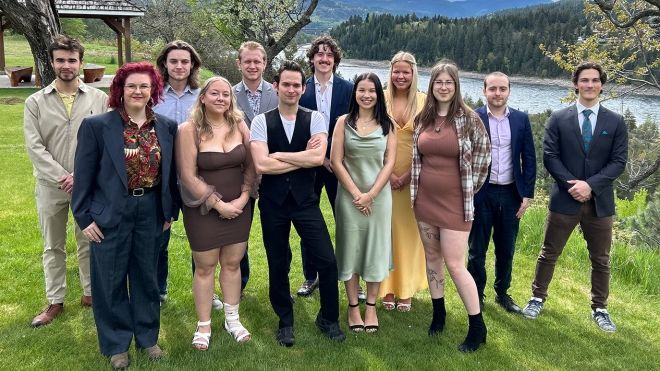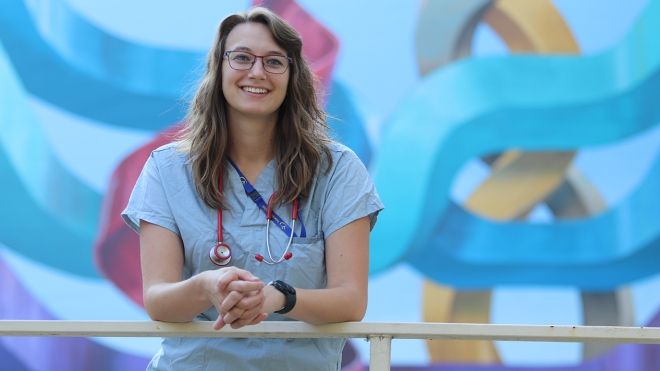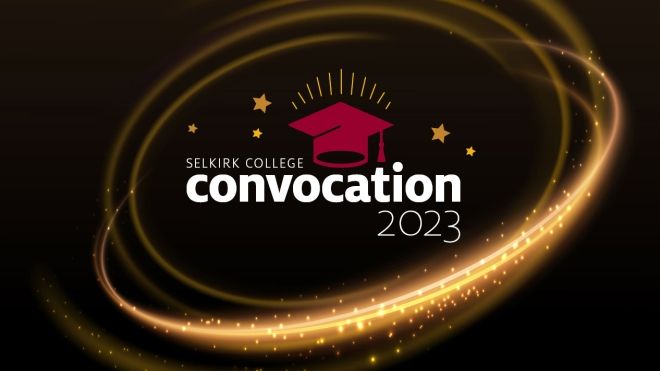Rural Pre-Medicine
Overview
Our health care system needs professionals who want to practice in rural, remote and Indigenous communities. Moreover, professional health programs are seeking students who have lived and studied in rural areas. Take the first steps toward a fulfilling career in the health sciences while studying in the beautiful Kootenay mountains.
Applications for Fall 2026 are open.
The comprehensive Rural Pre-Medicine Program pairs academic excellence with mentoring and community service opportunities, providing students with support to apply to medicine, pharmacy, optometry, dentistry, physical therapy, midwifery, veterinary medicine, naturopathy, public health, biomedical research and more. Students develop strengths in leadership, resilience, communication and collaboration as they progress along their pathway to a career in rural health.
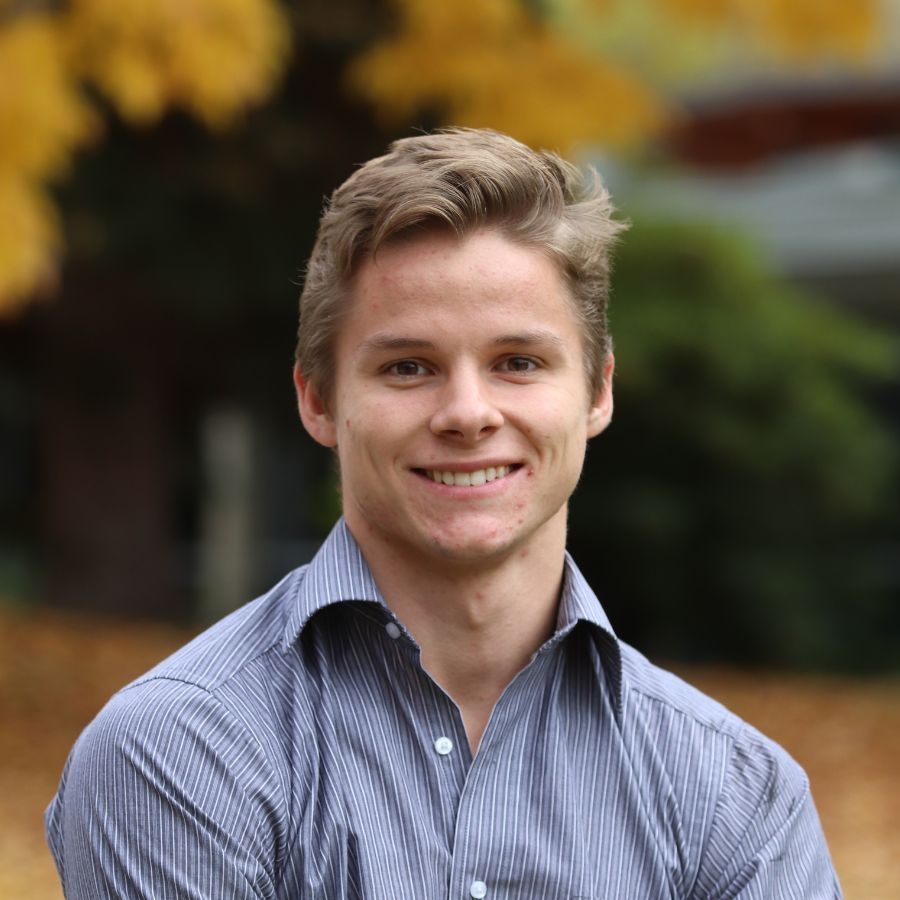
News
Program Outcomes
In addition to the outcomes for University Arts and Sciences, on completion of the program graduates will be able to:
- Demonstrate an academic foundation in the health sciences
- Demonstrate non-academic skills and strategies needed for subsequent health professional training
- Apply competitively to health professional programs
- Articulate the unique characteristics of rural health care
- Distinguish different paths to careers as rural health professionals
Admission Requirements
Individuals applying for admission to the Rural Pre-Medicine Program should apply during the application period. Exact dates are posted on the Rural Pre-Medicine page on the college website. Applicants must have graduated from secondary school (or equivalent) and completed the following BC Provincial Curriculum courses (or their equivalents) with a minimum of 67% in each course:
- English Studies 12 or English First Peoples 12 or IELTS (minimum 6.5)
- Pre-calculus 12
- Two other Grade 12 courses, one of which must be a science course, biology (e.g. Anatomy and Physiology 12) and chemistry are strongly recommended
- Chemistry 11
Students interested in the program who do not have the prerequisites should consult with the UAS School Chair to discuss possible pathways.
Before an application is considered complete, the following must be received:
- Completed Selkirk College application form
- Completed RPM Program Application Form
- Official transcripts from all secondary schools and any post-secondary institutions attended
- Completed RPM personal reference forms
APPLICATION PROCESS:
1. Admission to the Rural Pre-Medicine Program is a selective admission process. Successful applicants are identified through the combined evaluation of academic qualifications, non-academic activities, and connection to rurality. A limited number of the most qualified applicants will be admitted into the program based on availability of seats.
2. Written offers will be sent to successful applicants. Receipt of a $500.00 non-refundable seat deposit by the offer-acceptance deadline is required otherwise the offer will be considered declined.
3. Once the available seats have been filled, a waitlist will be created for the current intake. The waitlist will be populated based on the review of applications in the original selection process. Applicants on the waitlist will be offered seats that become available after the offer-acceptance deadline.
4. Applicants who are not accepted into the program will receive notification.
5. Applicants who are not admitted or do not take a seat in a given year must reapply to be considered in a subsequent admission cycle.
In order for a student to remain in the RPM Program from one year to the next, the following requirements must be met:
a) Completion of all required RPM courses with a minimum grade of 60% in each course.
b) A minimum cumulative GPA of 3.00 for the year.
A student who fails to satisfy a) or b) must receive permission from the School Chair or designate for an alternate plan for completing the required courses in the program. If permission is not granted or the student fails to adhere to the plan, then the student may be withdrawn from the program.
To qualify for graduation with an Associate of Science in Rural Pre-Health, a student must have a cumulative GPA of 3.00 and successfully complete all of the required courses from the first and second year of the RPM Program.
To qualify for graduation with an Advanced Diploma in Rural Pre-Medicine, a student must have a cumulative GPA of 3.00 and successfully complete all of the required courses from the third year of the RPM Program.
Courses
BIOL104 - Biology I
BIOL 104 Biology I is a course designed for those students who require first year Majors biology in their program of study or who wish to go on to further study in biology. The course includes cell biology, biochemistry, and an examination of the processes of life in the plant and animal body. A strong emphasis is placed on the development of critical thinking skills through problem solving, a scientific research proposal, and laboratory analysis.
CHEM122 - General Chemistry I
CHEM 122 General Chemistry I is an introductory general chemistry course leading into science or engineering programs for students who have a solid chemistry background, including Chemistry 12 or equivalent. After a short review of fundamental chemistry, classical and quantum mechanical concepts are used to discuss atomic and molecular structure. The course ends with an investigation of intermolecular forces in liquids and solids. The lab work stresses scientific observations and measurements using chemical syntheses and quantitative analyses.
CHEM110 - Fundamentals Of Chemistry I
CHEM 110 Fundamentals of Chemistry I is an introductory general chemistry course leading into science or engineering programs for students who have taken CHEM 11 (or equivalent) or who need improvement to their chemistry background. It provides an extensive review of the fundamentals of chemical nomenclature, reactions and stoichiometry involving solids, gases and solutions. Current theories for atomic and molecular structure are introduced. The course ends with an investigation of intermolecular forces in liquids and solids. The lab portion of this course is the same as CHEM 122.
ENGL110 - College Composition
ENGL 110 introduces students to the world of scholarly writing -- reading it, thinking about it, and producing it as academic researchers. Students will explore how professional and/or academic writers across disciplines communicate to a variety of audiences. Students will practice active reading, writing and critical thinking skills by conducting scholarly research on a topic. This course aims to equip students with the skills and knowledge they need to write effectively within academic contexts.
MATH100 - Calculus I
MATH 100 Calculus I is a course designed to provide students with the background in calculus needed for further studies. This course includes a review of functions and graphs; limits; the derivative of algebraic, trigonometric, exponential and logarithmic functions; applications of the derivative including related rates, maxima, minima, velocity and acceleration; the definite integral; an introduction to elementary differential equations; and applications of integration including velocity, acceleration, areas, and growth and decay problems.
PSYC100 - Introductory Psychology I
PSYC 100 Introductory Psychology I is an introduction to the methods, theory and practice of psychology as a science. Among others, topics will include motivation and emotion, learning and memory, biological foundations, sensation and perception. Other topics are added at the discretion of the individual instructor. Class demonstrations and activities are used to illustrate concepts. Teaching methods and resources in the course vary with the instructor.
RPM120 - Rural Health Issues I
RPM 120 Rural Health Issues I is a one-credit course designed to introduce students to the medical profession in general and the distinct challenges of rural physicians in particular. Information will be provided on pathways into the profession, preparation for application to medical school, the branches of medicine, and the work conducted by practicing rural physicians. The course will include field trips to various healthcare facilities and guest lectures from practicing rural physicians. Students will explore various facets of preparation for medical practice through small-group projects and presentations. Professionalism will be emphasized throughout the course.
The profession of rural physician will be introduced by way of invited speakers, tours, lectures, and discussions.
BIOL106 - Biology II
BIOL 106 Biology II. Along with BIOL 104 (Biology I), this course provides an overview of the study of living things. Biology 106 presents topics in population, community and ecosystem ecology, and classical and molecular genetics. Evolution provides a unifying theme for the course. A strong emphasis is placed on the development of critical thinking skills through problem solving, case studies and laboratory investigation.
CHEM125 - Foundations Of Chemistry II
CHEM 125 Fundamentals of Chemistry II is the continuation for either CHEM 110 or CHEM 122. The course consists of two major units: physical chemistry and organic chemistry. The study of physical chemistry begins with an investigation of reaction rates (kinetics), followed by the principles of equilibria applied to pure substances and aqueous solutions, and an introduction to the laws of thermodynamics. The second major unit is a survey of the field of organic chemistry; topics include the physical and chemical properties of alkanes and alkenes, stereochemistry, and addition, substitution, and elimination reactions. The laboratory work involves the measurement of physical and chemical properties as well as chemical syntheses.
ENGL111 - Introduction to Literature
ENGL 111 Introduction to Literature is about living more intensely. Rather than providing answers, literature prompts us to ask better questions of ourselves and each other. Drama, poetry, short stories, and novels will guide us in discussion, reflection, and writing about literature.
MATH101 - Calculus II
MATH 101 Calculus II is a sequel to Math 100 for students who wish to major in science, math or engineering and includes the definite integral, applications of the definite integral to volume, arc length and surface area of revolution; inverse trig functions; techniques of integration; improper integrals; parametric equations and polar coordinates; linear first order differential equations; and an introduction to infinite series; convergence and power series; Taylor Polynomials.
PSYC101 - Introductory Psychology II
PSYC 101 Introductory Psychology II covers topics include thinking and other cognitive processes, development of the individual, personality, mental disorders, health and social psychology. Other topics are added at the discretion of the instructor. Class demonstrations and activities are used to illustrate concepts. Teaching methods and resources in the course vary with the instructor.
RPM121 - Rural Health Issues II
RPM 121 Rural Health Issues II continues RPM 120's emphasis on the unique experiences and needs of rural health professionals. The course introduces students to the concept of inter-professional practice and to various communication skills needed for effective teamwork. Students will develop awareness and skills in respectful listening, compassionate communication, group process, and conflict transformation. Attention will also be paid to issues of social power and privilege, prejudice, discrimination, and what is required to overcome these.
BIOL204 - Cell Biology
BIOL 204 Cell Biology provides the student with a thorough knowledge of cell structure and function. Topics covered include biomolecules, membranes, organelles, cell movement, cell signaling, gene regulation, and transcription and translation. Experimental techniques used in modern cellular and molecular biology are also introduced.
CHEM212 - Organic Chemistry I
CHEM 212 Organic Chemistry I explores the relationship between the structures of carbon-containing molecules and their physical and chemical properties. Some topics from 1st-year general chemistry are reviewed briefly: alkanes, stereochemistry, alkenes, and nucleophilic substitution and elimination reactions of alkyl halides. The correlation between structure and acidity is investigated, and the chemistry of alkynes and alcohols is examined. Structure-determination techniques, including IR and NMR, are explored. The laboratory work for this course provides practical experiences with separation/purification techniques, molecular synthesis, and qualitative analytical methods applied to organic compounds.
INDG101 - Indigenous People's Relationships: Once You've Heard the Story
INDG 101 Indigenous People's Relationships: Once You've Heard the Story. Students are introduced to how colonial policies and legislation has and continues to impact relationships between Indigenous Peoples (First Nations, Metis, Inuit), settlers and the Canadian and Provincial governments, and the broader western world view. The oral system of historical documentation, Indigenous stories, testimonies, and other evidence are critically examined. Students will explore and analyze how Indigenous resilience and resurgence is building self-determination and supporting reconciliation. Students will build awareness and insight into Indigenous worldview, teachings, protocols, and methodologies. Circle pedagogy and oral presentation are key components. This is an interactive relational course that requires committed respectful class community engagement with the composition of a commitment statement. This course is foundational to INDG100 and certain topics will be explored further in other programs.
PHYS102 - Basic Physics I
Physics 102 Basic Physics I is an algebra-based survey of mechanics. Course material includes basic concepts of vectors, particle kinematics and dynamics, energy, momentum, circular and rotational motion, thermal properties of matter, vibrations and sound, and fluids.
PHYS104 - Fundamental Physics I
Physics 104 Fundamental Physics I is a calculus based overview of the fundamentals of classical mechanics. This course is suitable for those interested in further study in the physical sciences and in engineering. Classical mechanics describes the physical phenomena occurring in the real world around us. We study linear and rotational motion of objects, and then consider how forces cause motion, using Newton's laws. We next use conservation of energy and conservation of momentum to describe the motion of objects. Finally we investigate heat transfer and simple harmonic motion. These topics form a basis for future physical science and engineering courses.
RPM220 - Rural Health Issues III
RPM 220 Rural Health Issues III builds on the skills and knowledge acquired in year-one RPM courses, with a special focus on social and economic determinants of health. The course also seeks to develop students' empathy, self-awareness, and respect for diversity.
STAT206 - Statistics
STAT 206 Probability and Statistics is an introductory applied statistics course for math, science, and engineering students. Topics include: set theory, probability, discrete and continuous variables and their distributions, joint probability distributions, point estimates, confidence intervals, hypothesis testing based on one or two samples. If time permits, we will discuss ANOVA tests as well as correlation and regression.
BIOL206 - Introductory Biochemistry
BIOL 206 Introductory Biochemistry provides an introduction to biochemistry including protein structure and function, and representative catabolic and anabolic pathways. Topics covered include water, enzyme kinetics and enzyme structure and function. Experimental techniques used in biochemistry and molecular biology are also introduced.
BIOL212 - Microbiology
BIOL 212 Introduction to Microbiology is a survey of the microbial world, with discussions of the medical and ecological significance of key organisms. The biology of micro-organisms (including bacteria and viruses) is a key focal point, but there will also be discussions of immunology and pathology. The laboratory component will build basic skills necessary to perform and interpret research in the fields of medical microbiology, industrial microbiology, environmental microbiology, immunology and virology. A basic knowledge of biology will be presumed, including basic cell biology, ecology, physiology, biochemistry and metabolism.
CHEM213 - Organic Chemistry II
CHEM 213 Organic Chemistry II is a continuation of CHEM 212. The survey of organic families is continued with a study of aldehydes and ketones, carboxylic acid derivatives, aromatics and amines. The chemistry of a variety of compounds of biological interest is also discussed. The laboratory work involves synthesis and organic structure determination.
PHYS103 - Basic Physics II
PHYS 103 Basic Physics II is an algebra-based survey of the basics of electromagnetism and modern physics. This course is suitable for those pursuing studies in the life sciences or others who do not plan to pursue careers in the physical sciences or engineering. We first study electrostatics of particles. This leads into electric circuits involving resistors and capacitors. Next we look at magnetism. Finally we investigate topics applicable to life sciences, such as electromagnetic waves, sound, and nuclear physics. The lab component of the course is an opportunity to reinforce concepts and content from the course, and to develop experimental method and reporting results.
PHYS105 - Fundamental Physics II
PHYS 105 Fundamental Physics II is a calculus-based survey of the basics of electromagnetism. This course is suitable for those interested in further study in the physical sciences and in engineering. Electricity and magnetism form the basis for all modern electrical devices we utilize today and design for the future. We first study electrostatics of particles and simple objects. Then we investigate circuits involving electrical devices such as resistors, capacitors, and inductors. We next study how electricity and magnetism interact with each other both in circuits and in waves. Finally we look at modern subjects in physics such as semiconductors or nuclear physics. These topics form a basis for future physical science and engineering courses.
RPM221 - Rural Health Issues IV
RPM 221 Rural Health Issues IV builds on the skills and knowledge acquired in the preceding RPM courses. It focuses on issues related to rural health, in particular the way in which those issues affect the role and responsibilities of the rural health professional. This course further develops students' self-assessment and communication skills as well as provides preparation for interviewing with professional health programs.
BIOL164 - Human Anatomy and Physiology I
BIOL 164 Human Anatomy and Physiology I. This course provides an integrative approach to the normal structure and function of the human body. Repair and replication, structural support, nervous integration, movement and metabolism are examined at the cellular, tissue and system levels. Recent scientific discoveries are presented as a means of relating the systems studied to various applied disciplines including health care and Kinesiology.
BIOC302 - General Biochemistry
BIOC 302 General Biochemistry builds on principles of biochemistry explored in BIOL 206. The biosynthesis of lipids, amino acids and nucleotides will be discussed. DNA, RNA and protein metabolic pathways will be explored, along with regulatory mechanisms. The laboratory component uses techniques introduced in BIOL 206 to study the fundamental components of cellular function.
CHEM225 - Physical Chemistry for Biosciences
CHEM 225 Physical Chemistry for Biosciences presents the basic concepts of chemical thermodynamics and kinetics that apply to biological systems. Students will explore why gases would behave differently at different conditions (e.g. deep sea diving, high altitude, other planets), how ideal engines function, why some reactions spontaneous, how do we explain the effect of salting roads in winter, how batteries and our metabolism generate energy, how kinetics is related to thermodynamics (why diamonds do not break down into graphene) and how we use of spectroscopy to explore biological structures. In the laboratory, quantitative properties of systems are measured, to illustrate the theory discussed in lectures.
PHIL210 - Biomedical Ethics
PHIL 210 Biomedical Ethics explores ethical moral questions that arise in the context of healthcare. Students will engage with these questions by learning ethical theory and by studying challenging cases. They will outline the relevant features of real life examples, weigh moral considerations, and practice articulating recommendations about what to do. The course covers biomedical topics such as autonomy, informed consent, surrogate decision-making, traumatic brain injury, refusing care, medical assistance in dying, assisted reproduction, abortion, public health, organ donation, genetic screening and therapy, research and experimentation, rural medicine, and global health intervention. While this course is geared primarily to Rural Pre-Medicine students, it may be of interest to anyone concerned with biomedical research and healthcare.
PSYC202 - Research Methods
PSYC 202 Research Methods. This course introduces prospective Psychology majors to the major methodological principles that guide research in Psychology. The primary focus is on experimental design, but students will be exposed to some elementary statistics. Topics include critical thinking and scientific reasoning, principles of measurement, types of variables, validity and reliability, and research ethics. Weekly labs offer hands-on applications of basic concepts to the design of research.
SOC205 - Introduction to Social Research
SOC 205 Introduction to Social Research introduces students to research methods in the social sciences. Students will be introduced to the major procedures for carrying out systematic investigation of the social world. It will encourage students to critically evaluate the methods, strategies and data that are used by social scientists and provide training in analysis of a range of qualitative and quantitative data.
RPM320 - Rural Health Issues V
RPM 320 Rural Health Issues V builds on the communication skills learned and practiced in previous RPM courses. Throughout year 3 of the Rural Pre-Medicine Program, students will work on a health-related rural community applied research project, which may include local and international opportunities for experiential learning. In RPM 320, students will apply research knowledge and methodologies to create a community-based project proposal. Students will gain practical knowledge through a variety of hands-on skills such as teamwork, group facilitation, project planning and implementation, and teaching/learning.
BIOL165 - Human Anatomy and Physiology II
BIOL 165 Human Anatomy and Physiology II is a continuation of Biology 164. This course covers the cardiovascular, respiratory, lymphatic, urinary and digestive systems. Endocrinology is discussed throughout as a means of integrating the various systems to the function of the body as a whole. The focus remains on application of knowledge gained in this course.
BIOL202 - Principles of Genetics
BIOL 202 Principles of Genetics. This course provides the student with a knowledge of classical and reverse genetics. Topics covered include Mendelian inheritance, chromosome theory of heredity, sex determination, mutation, the structure and function of genes, molecular genetics, and the genetic structure of populations. Experimental techniques used in molecular genetics are also introduced.
INDG302 - Indigenous Health And Healing
INDG 302 Indigenous Health and Healing introduces students to the topic of Aboriginal health and healing from the time prior to first contact with European newcomers through to the present. We will also focus on cultural awareness and critical thinking on current Aboriginal health and healing issues. Aboriginal health and healing will be explored from within a variety of Aboriginal perspectives that are inclusive of the physical, mental, emotional and spiritual aspects of health and well-being. Skill-based training in cultural safety and anti-racism based on the recommendations and information provided by the Truth and Reconciliation Commission results and the 'calls to action' will be emphasized. Aboriginal worldviews and 'ways of knowing' will be embedded in the course delivery as well as course content.
RPM321 - Rural Health Applied Research Project
In RPM 321 Rural Health Applied Research Project, students will implement the health-related project proposals developed in RPM 320. Students will continue to consolidate hands-on skills such as team work, group facilitation, project planning and implementation, and teaching/learning.
Tuition & Fees
All amounts are estimates and are subject to change. Tuition amounts are based on a full-time course load. Please note that many programs have additional costs beyond those listed here. For more information, please visit Tuition & Fees.
Find Out More
We look forward to connecting with you! Fill out this form and we'll reach out to you.

